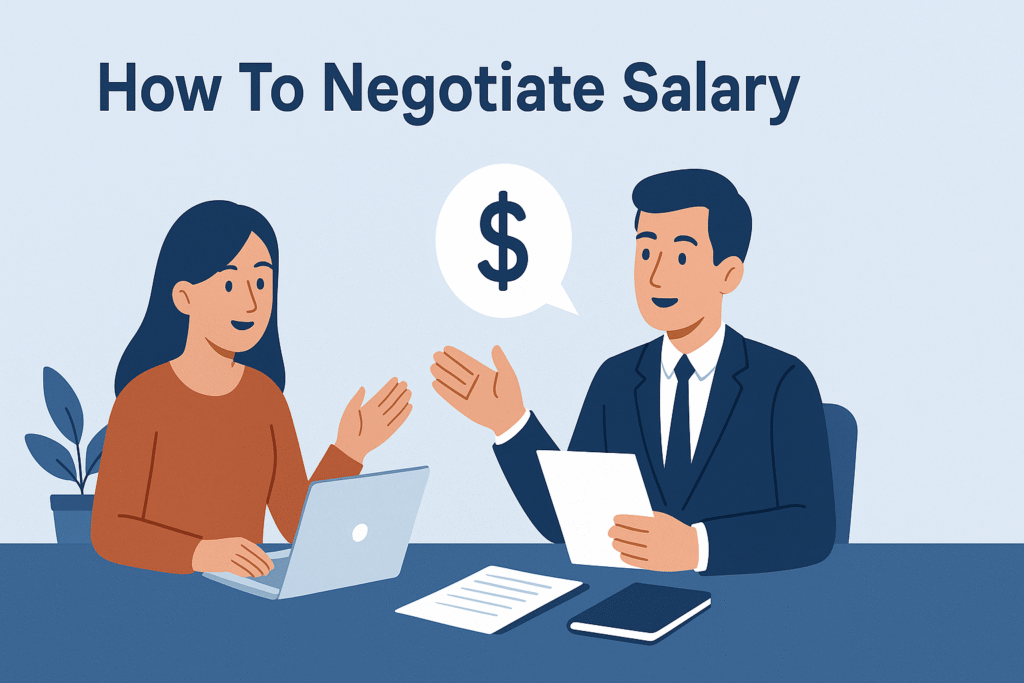Congratulations! You’ve received a job offer—now what? Before signing on the dotted line, it’s important to know how to negotiate salary after a job offer. Salary negotiation might feel intimidating, but with the right strategy, you can confidently ask for the compensation you deserve.
In this post, we’ll guide you step-by-step through how to negotiate your salary after receiving a job offer, including tips, scripts, and key mistakes to avoid.

Why You Should Negotiate Your Salary
Many job seekers accept the first offer out of excitement or fear of losing the opportunity. But most employers expect some negotiation. In fact, negotiating your salary can lead to significantly higher earnings over your career.
By negotiating:
- You ensure fair compensation for your skills.
- You set a confident tone from day one.
- You may unlock better benefits beyond just pay.
When to Negotiate Salary After a Job Offer
The ideal time to negotiate salary is after you receive a formal offer but before you sign the contract. This is when you have the most leverage—they’ve chosen you, and replacing you would take time and resources.
Steps to Negotiate Salary After Receiving a Job Offer
1. Express Gratitude and Enthusiasm
Start by thanking the employer for the offer. Show that you’re excited but need time to review the details.
Example:
“Thank you so much for the offer. I’m really excited about this opportunity and would love a day or two to review the terms before getting back to you.”
2. Research the Market Rate
Before negotiating, know your worth. Use sites like:
- Glassdoor
- Payscale
- Fair Work Australia (for Australian jobs)
Look at salaries for similar roles in your location and industry. Consider experience, education, and certifications.
3. Decide on a Reasonable Salary Range
Based on your research, come up with a salary range that reflects your value. Make sure the bottom of your range is a number you’re willing to accept.
4. Prepare Your Pitch
Frame your request in terms of value and data, not personal need.
Example:
“Based on my experience with [specific skills or projects], and current market trends, I was hoping we could discuss a base salary in the range of [$X–$Y]. I truly believe I can bring significant value to your team.”
5. Be Ready for Other Negotiables
If the employer can’t meet your salary expectations, ask about:
- Performance bonuses
- Remote work options
- Additional leave
- Professional development opportunities
- Signing bonus
Sometimes, non-cash benefits can bridge the gap.
What to Avoid When Negotiating Salary
- Don’t make it personal – Avoid mentioning rent, student loans, or personal expenses.
- Don’t accept right away – Always review the offer before committing.
- Don’t be aggressive – Stay professional, polite, and solution-focused.
- Don’t bluff – Only reference competing offers if they actually exist.
Final Thoughts: Confidence is Key
Learning how to negotiate salary after a job offer is a vital career skill. Employers respect candidates who know their worth and communicate professionally. The worst they can say is “no”—but often, you’ll walk away with more than you were originally offered.
Bonus Tip: Always get the final agreement in writing before resigning from your current job.
Want more tips on career growth, salary calculators, and interview strategies? Explore helpful tools and resources on Fair Work Australia.
Sufiyan, a passionate IT professional and finance enthusiast dedicated to simplifying financial clarity for every Australian. With years of experience in both tech and personal finance, Sufiyan oversees all content to ensure accuracy, usability, and relevance.
